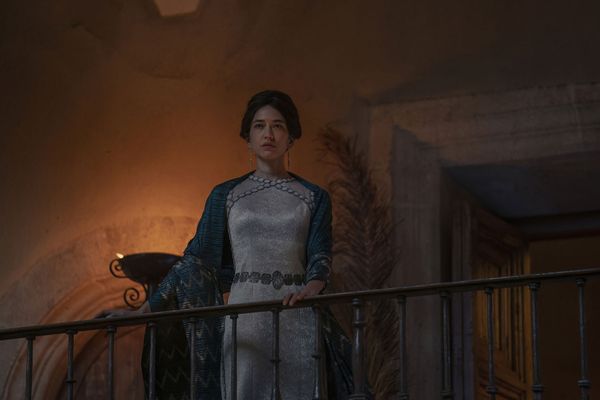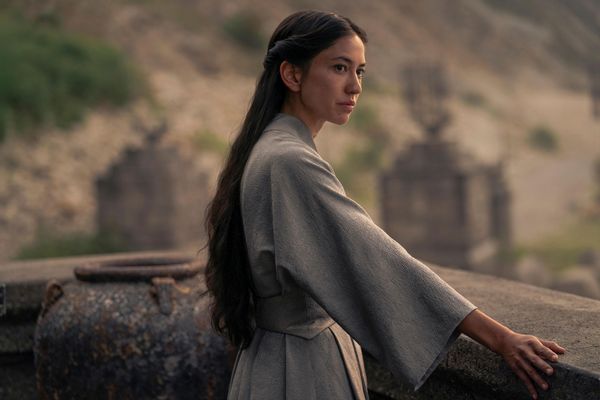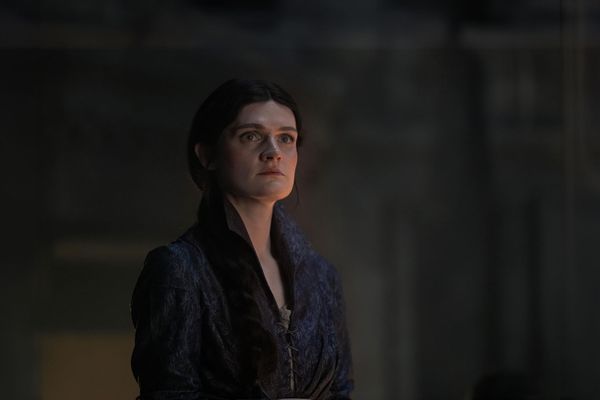
Harrenhal, the notorious power pit of a stronghold featured in George R.R. Martin’s stories, ends up being something of a strange spiritual retreat for Prince Daemon Targaryen (Matt Smith) on “House of the Dragon.”
Easily taken from a castellan with no love for his great nephew Lord Larys Strong, it’s a crumbling, leaky mess from stem to stern. For a conflict-loving man like Daemon, not even its deferential staff provides much entertainment. Except, that is, for Alys Rivers (Gayle Rankin).
From the moment Daemon interrupts Ser Simon Strong (played by Sir Simon Russell Beale) as he’s dining on venison with cabbage and peas – sorry, no red currants on offer here – Daemon is surrounded by stooped servants. He badgers them into referring to him as “your grace,” reminding him that he is the husband of Rhaenyra Targaryen (Emma D’Arcy) and therefore the king consort.
The sole holdout is Alys who, in “The Burning Mill,” strides into a roomful of bowing men and stares directly at Daemon with nary a curtsy. Their second meeting is in the castle’s godswood, where she soothes his insomnia with the assurance, “You will die in this place.”
Once Daemon finally engages Alys in a direct conversation during the fourth episode, “The Red Dragon and the Gold,” she doesn’t refer to him as “my king” or “your grace” or any royal titles.
To her, he’s just another man jealous of his wife’s power who would rather run from that truth than face it. To him, she’s a witch – or a bastard, as he calls her when she tells him her last name is Rivers, not Strong. Instead of taking that as a signal to know her place, she blithely replies, “Once you get to know me, you’ll find I’m not so bad.”
In the oh-so-serious realm that “House of the Dragon” is building, Alys serves the type of wry humor you can only get from a woman unimpressed with the likes of Daemon and other highborn men who have come and gone before him.

After he dumps her, Mysaria disappears from the story only to resurface as the unofficial mistress of whispers who knows everything going on in the streets and the belly of the Red Keep. That gives her power until she makes the mistake of flexing it in the face of Otto Hightower (Rhys Ifans), who responds by burning the livelihood she built from nothing to the ground.
Season 2 shows this to be a minor setback as Mysaria emerges once again from Dragonstone’s prison and talks her way into the queen’s inner circle. Rhaenyra decides they have a common enemy, and that hatred is something you can trust more affection.
Besides, Mysaria more than proves her worth by thwarting an assassination attempt on Rhaenyra — although, as she tells her queen when she first tried to warn her guards, they didn’t believe her. Which tracks with this franchise’s overall consideration of what a woman’s word is worth.
“House of the Dragon” has stood by its word to refrain from using sexual exploitation as a narrative device in the same manner as “Game of Thrones” creators D.B. Weiss and David Benioff. Instead, the series expands on a main subtext introduced by its predecessor by depicting all the ways the men of the realm fail to take women seriously.
The primary players in this exasperation play are Rhaenyra and her cousin and ally Princess Rhaenys (Eve Best), who warns her from the moment she’s named heir that the men of the realm would rather put the place to the torch than see a woman sit on the Iron Throne. Still, when Rhaenyra sets her mind to claiming what is rightly hers, Rhaenys backs her – eventually to the death.
Before The Queen That Never Was met her end, she faced the many indignities of a small council full of minor lords dismissing her substantial efforts at leadership and scoffing at her granddaughter Baela’s (Bethany Antonia) reconnaissance efforts. Although Baela follows orders from her queen not to engage, she’s chastised by the men supposedly counseling Rhaenyra.
“You should have burned them when you had the chance,” says an especially snippy Ser Alfred Broome (Jamie Kenna) in reply to her report about the enemy’s movements.
“Perhaps you can, Ser Alfred, when you next sight them on your dragon,” Baela replies. Yet to them, she is still a highborn woman – a child, no less — expected to know her place among her men, dragon and political position notwithstanding.
That reality long chafed Rhaenys, who says as much to Alicent (Olivia Cooke) near the first season's end when the elder royal questions the younger’s dedication to toiling in the service of men – her father, her freshly dead husband, and now her sons.
“You desire not to be free, but to make a window in the wall of your prison,” Rhaenys says before whispering into Alicent’s ear, “Have you never imagined yourself on the Iron Throne?”
Rhaenys embodies the lifelong frustration of knowing what power social rank, wisdom and temperament should entitle a person to hold if not for the lack of a certain flesh member between one’s legs. Rhaenyra still battles it with her entirely male council smugly offering to prosecute a war for her despite her willingness and capability to do so and the fact that making decisions without consulting her amounts to treason.

The second season of “House of the Dragon” takes us into the houses, private and public, of the lowborn. We see an artisan pleading for the king to pay his workers struggling to put food on the table or obtain medicine for his sick child, and the measurably meager circumstances lived by the children fathered by kings, princes, and other noblemen.
Alys might have commanded more respect from Daemon if she were a Strong, but possibly not. In “Fire & Blood” Martin writes Alys as a witchy woman who may possess mystical foresight. Rankin plays her somewhere in the middle, leaving whether she was warning Daemon of his fate during their outside meet-and-greet or antagonizing him for sport as an open question.
As those “House of the Dragon” viewers who have read Martin’s book know, Alys may play a more significant part in Daemon’s story than what their brief interaction suggests.
To those for whom Alys Rivers is simply a new face, though, she signifies a type of character series co-creator Ryan Condal and his writers make integral to the show’s commentary about power, which is the version wielded by the powerless. Mysaria’s value is in her invisibility – nobody recognizes or listens to her, making her an effective spy.
Alys is part of the castle’s staff assumed to have no eyes, ears or voice, and that nothing she says matters. But she’s also integral to its operation since she’s Harrenhal’s makeshift maester. (The previous one “fled in the night,” she tells Daemon as she prepares a sleep aid she knows he needs even if he didn’t ask for it.)
That frees her to be completely honest about everything to everyone. “Did you come here after quarreling with your wife?” she asks the fearsome Daemon Targaryen, referring to her presumed queen as just another crabby spouse.

What’s he going to do, kill her?
After all, his dreams have told him the same thing. Besides, Harrenhal is trash – a rainy, desolate place cursed by its lord builder’s decision to chop down a grove of mystical weirwood trees to make way for its construction. Firing by death would be a relief.
But Alys knows neither Daemon nor any other man in charge has the stones to do that, in the same way Mysaria is right to suspect that value will rise regardless of which side wins in the Targaryen’s civil war.
Martin’s lesson in “House of the Dragons” and “Game of Thrones” before it is a simple one, echoed in Mysaria’s warning to Otto Hightower. “There is no power but what the people allow you to take.” The trick is in knowing which people are holding the keys to the vault in any situation, and what a woman is to them. From there, they can act accordingly and, to a degree that suits their mood and ability to profit —freely.
New episodes of "House of the Dragon" premiere at 9 p.m. Sundays on HBO and on Max.







